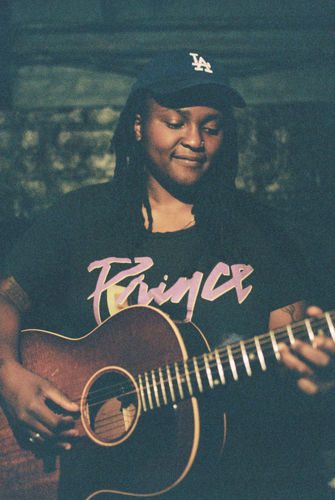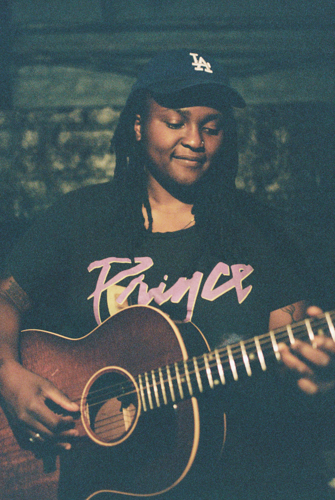
Joy Oladokun knew she wanted to move to Nashville within 30 minutes of her first visit. She was visiting from Los Angeles, where she had relocated after college and was working as a guitarist and backup singer. Charmed by the city and attracted to the way other songwriters and musicians seemed able to work and live seemingly normal lives with their families, Oladokun came to the conclusion that she stood a better chance of having a full-time career in music here.
“Music-wise, all my heroes spent time in Nashville or are from Nashville,” she tells the Scene over the phone. “So many of my songwriting heroes have a deep connection to the city. I found myself in L.A. a lot of times looking at people who were further down the road than me and being like, ‘I don’t wanna be like you when I grow up.’ When I’m in rooms with people [in Nashville], most of the time they’re motivated simply by, ‘How do you tell a really good story?’ I don’t know [if] there are tons of other places in the world that are doing that and doing it so well.”
Her gamble to move across the country paid off. Oladokun is now signed with publishing company Prescription Songs, and since settling in Nashville, she’s followed up her 2016 LP Carry with a slew of singles that showcase her unique artistry.
Oladokun’s storytelling is steeped in personal perspective. The singer-songwriter approaches soul- and R&B-influenced pop music with a refreshing delicacy, pairing lyrics that are often yearning, reflective and confessional with minimal arrangements and hymn-like structures. Her songs make the individual experience feel universal. Even her heartbreak ballads have a thread of optimism backed by spirituality, a worldview she’s adopted over the years from growing up in the church space and reckoning with her sexuality.
“Sunday,” released in the summer, is a song about coming out that’s honest about both the fear and the relief that are part of that process. Oladokun says she didn’t realize what she was writing the song about when she started it, but by distilling her emotional experiences into art, she created something that could help others cope.
“I think part of the reason I came out is, emotionally, I felt like it can’t be an accident that I am a queer woman of color in this day and age,” Oladokun says. “I can’t be silent and pretend like it doesn’t matter and ignore it. Making those decisions to empower yourself and to take care of yourself and then use that freedom that you’ve fought for to help liberate other people is everything. That approach is how I view my songwriting.”
Over the past year, Oladokun has spent a lot of time writing in her East Nashville home and re-examining what she’s after. Earlier this year, she posted four demos of songs she had been working on to YouTube. She wanted to put them out into the world in a pure form, as she heard them in her own head. Instead of selling a finished product, she felt liberated by giving fans something that was still in development. The new songs touch on topics like overindulgence in vices and relationships both spiritual and concrete, as well as members of a couple keeping space for each other after the honeymoon phase is over.
In “Faithful,” Oladokun examines anxiety about the ways other Christians may perceive her. She grew up singing in her family church in Casa Grande, Ariz., and later worked at a church in college. This is where she came to learn how to use her rich, warm voice, as she does so well in her songs. She finds it easy to see why so many people are passionate about their faith, but at the same time she questions how someone can say that God cares for everyone while excluding people of different sexual orientations. As a queer person whose spirituality is an important part of her daily life, Oladokun has learned to focus on self-acceptance and empathy.
“Being a black woman inhabiting a lot of white spaces, sometimes I’ll say things and feel things and be like, ‘Oh, these people don’t understand my tension and frustration because they haven’t experienced it,’ ” Oladokun says. “[‘Faithful’] became a reminder to me that I am a representative of my people and justice in the spaces that I happen to be in, and [to] continue to be faithful to that in a way that’s kind and compassionate.”
That’s a common thread through Oladokun’s songs — they each feel like a candid, stream-of-consciousness note to herself. Her vulnerability is key to helping her work through and let go of negative emotions, and that in turn makes clear that she’s coming from a place of honesty.






